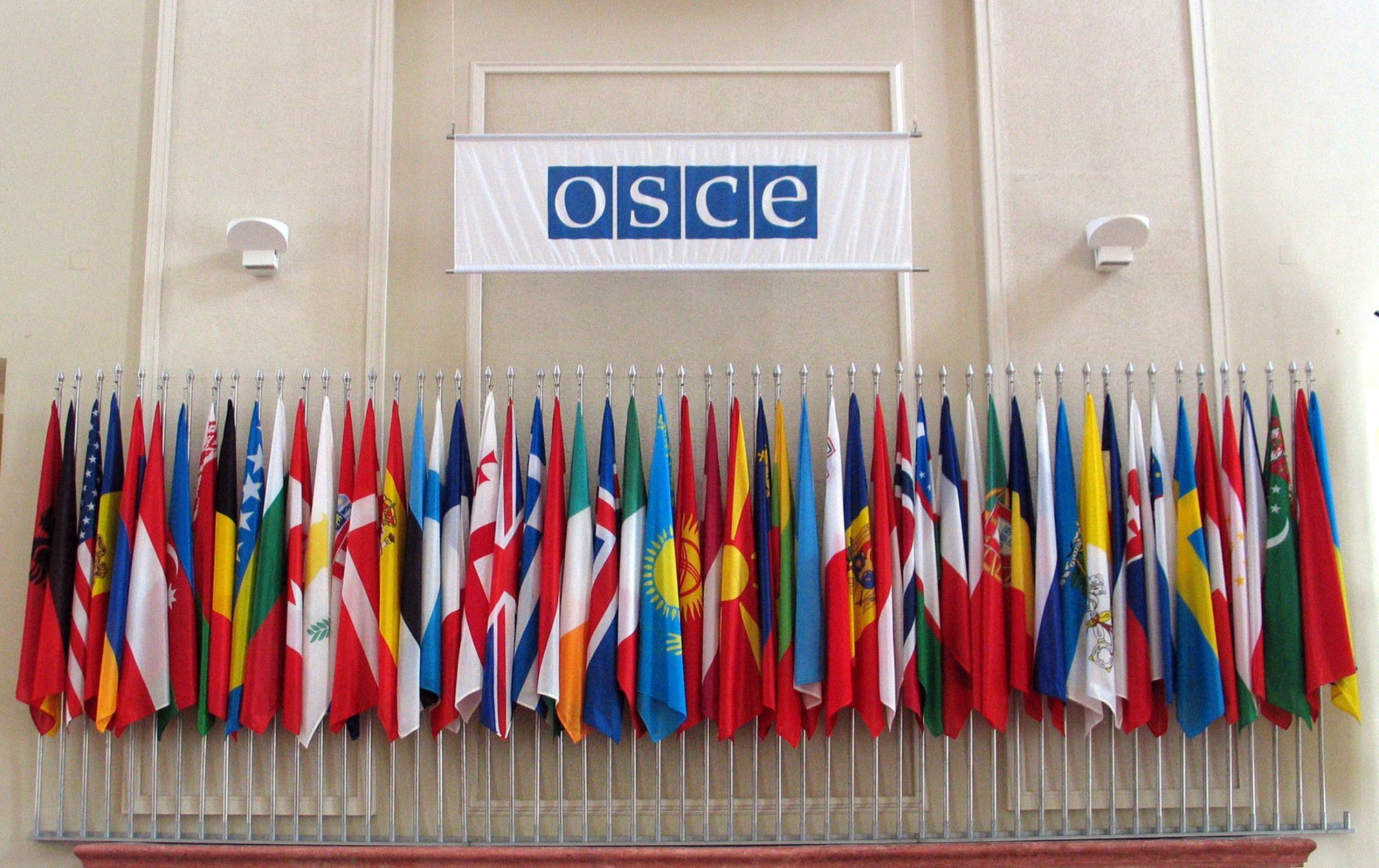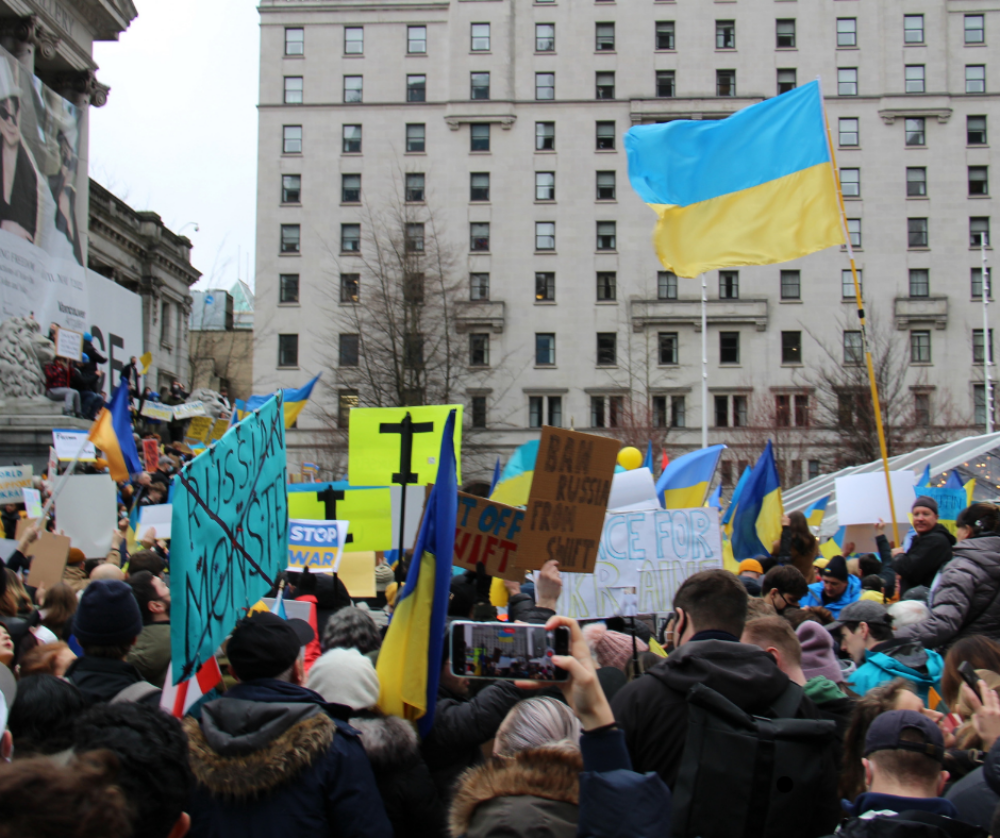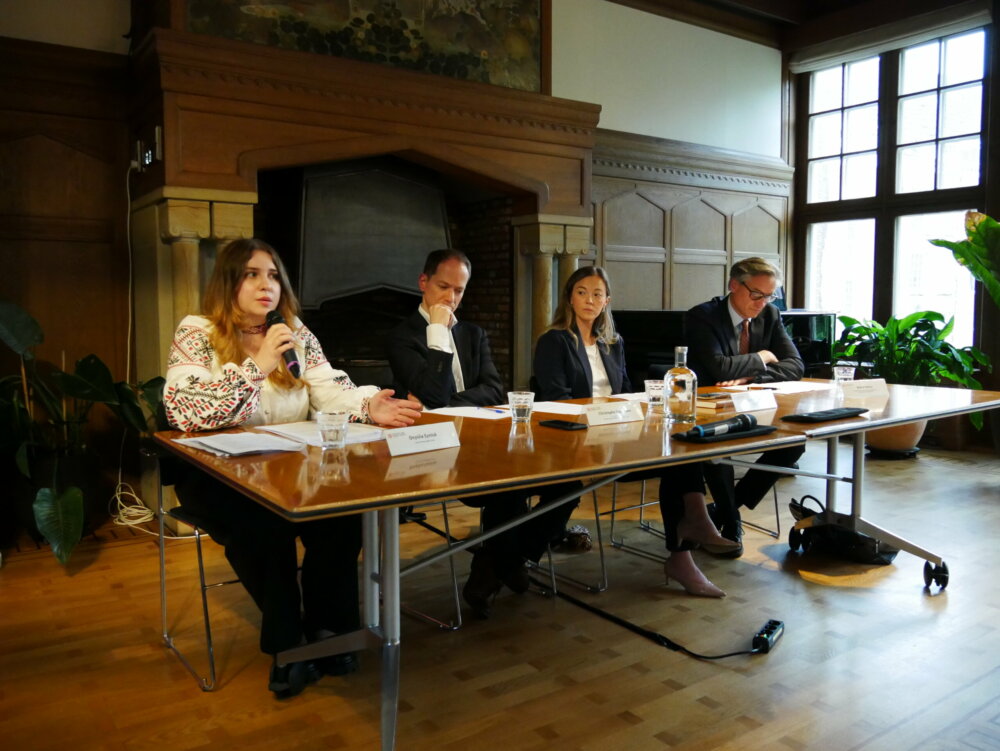OSCE/Mikhail Evstafiev

Showdown in Skopje: Can We Still Cooperate?
Foreign ministers of the world’s largest regional security organization will meet in Skopje on Nov. 30 to discuss the future of European security. Whereas just a few years ago, war in Europe was considered unthinkable, a violent conflict is raging in Ukraine and tensions are still high between Azerbaijan and Armenia after Baku’s invasion of Nagorno-Karabakh. Relations between Russia and the West are at their lowest point since the Cold War. In this context, is there still scope for cooperative security and can the OSCE be saved?
Existential crisis
The OSCE is in trouble. All ten principles of the Helsinki Final Act have been violated. Since decisions in the OSCE are taken by consensus, the polarized geopolitical environment is making it difficult to agree on anything – from the agenda of meetings to who should hold leadership positions in OSCE institutions. No unified budget has been adopted since 2021. Even a week before the Ministerial Council, it was not decided which country would chair the OSCE in 2024 – a decision that is usually taken at least a year in advance. At a time when dialogue, de-escalation and détente are so badly needed, the OSCE – which is a place for all three – is facing an existential crisis.
OSCE foreign ministers meeting in Skopje should be aware of what is at stake. If the current gridlock continues, not least due to the failure to agree on a budget, it may become necessary to significantly scale back the organization’s operational activities. This could include closing field missions and scaling back institutions. Under this scenario, the OSCE would be kept on a life-support system until when there is a more favorable geopolitical climate.
A second scenario is that the OSCE area could split into two security communities. As recently as 2010, at the last OSCE Summit which took place in Astana, OSCE heads of state agreed on working towards the realization of a Euro-Atlantic and Eurasian security community stretching from Vancouver to Vladivostok rooted in agreed principles, shared commitments and common goals. This dream died in the Donbas. Now both Ukraine and the OSCE area are divided.
A split between a Euro-Atlantic security community with the European Union and NATO at its core and a Eurasian security community focused around the Eurasian Economic Union, the CSTO and a revamped Conference on Interaction and Confidence Building Measures in Asia (CICA) would leave little or no role for the OSCE unless it acts as a bridge between the two halves of the continent. This scenario is less likely than the first since there are several countries that want good relations with both Russia and the West and which would therefore not want to find themselves exclusively in one camp or the other.
A third possible scenario is that the OSCE collapses. International organizations seldom die, but they can drift into irrelevance. If participating States cannot come to an agreement on the organization’s budget and leadership and the OSCE is no longer considered by a critical mass of its participating States as being fit for purpose to deal with the real security challenges of the day, it risks lurching from one crisis to the next and even going out of business. Similarly, if Russia decides to leave the organization or is kicked out of the OSC, or if some countries conclude that cooperative security is no longer possible with Russia and withdraw from the OSCE, the organization would lose its advantage of being an inclusive pan-European security organization.
The Skopje meeting is therefore not just another ministerial gathering. The very existence of the OSCE is at stake.
Who cares?
Some may shrug and say “who cares?”. But as the old song goes, you “Don’t Know What You Got Till It’s Gone”. Without the OSCE, there would no longer be a pan-European security arrangement that includes all countries of the northern hemisphere. OSCE field activities and institutions would no longer build capacity or provide early warning in participating States, Europe would lose a valuable box of tools for conflict prevention, crisis management and peacebuilding, and there would no longer be support from substantive units of the Secretariat on a wide range of issues from reducing the risks of cyber-attacks or human trafficking, to enhancing regional cooperation on disaster risk reduction or intelligence-led policing.
The timing could not be worse. With so many other problems in the world, regional organizations are being called upon to take on more responsibility for dealing with crises in their region. In his New Agenda for Peace, the UN Secretary-General calls for a stronger emphasis on diplomacy, prevention, and more robust regional organizations to promote trust-building, transparency and détente. If the OSCE dies, who would answer the call?
Without the OSCE, dialogues on European security would take place either in a revived NATO-Russia Council, between the EU and Russia, bilaterally between Washington and Moscow, or in the UN Security Council where permanent members in the OSCE area (France, Russia, United Kingdom and the United States) would play a leading role. This would put countries that are not part of such discussions at a big disadvantage and it would undermine the idea of sovereign equality which is so central to the OSCE. Furthermore, the 57 participating States would lose the normative basis that has provided a key framework for defining how states should behave towards each other and their peoples.
It should be kept in mind – not least by those who are indifferent about the fate of the OSCE – that the demise of the OSCE would not mean the end of the problems that it is trying to fix. Political leadership rather than structures will change the conditions affecting European security. Furthermore, it would be very difficult, if not impossible, under the current circumstances to create from scratch something like the OSCE and to agree on principles and commitments like the ones which have been endorsed by all participating States. Therefore, the OSCE should be preserved.
Big opportunity
While the OSCE faces its biggest crisis since 1975, it could also seize its biggest opportunity since the end of the Cold War in 1990. If the OSCE can survive, eventually it could enter a new phase that would renew the organization in an altered and challenging security environment. It would have a raison d’être and a leading role in rebuilding the European security architecture after the war in Ukraine. Furthermore, it could play a key role as a regional arrangement of the United Nations in addressing a wide range of threats and challenges that have an impact on peace and security in the OSCE area.
We are a long way from that point. But “no business as usual” does not have to mean no business at all. There are plenty of useful things that the OSCE can do through the substantive units in the Secretariat, field missions and institutions. While the OSCE will probably not have a major role in ending the conflict in Ukraine, its toolbox could be used for example to promote local stabilization measures, confidence-building measures, help build capacity, and to maintain channels of communication.
The OSCE could also play an important role in managing relations between Russia and the West. The Structured Dialogue process, which was launched in 2016, would be a suitable forum. It may also be necessary to create informal spaces for dialogue, including at the Ministerial level.
Track 2 or track 1.5 conversations involving experts with good links to policy makers in capitals could develop scenarios or options for rebuilding some degree of trust between Russia and the West. When the time is ripe, these ideas could be taken out of the drawer and brought to the inter-governmental table.
The case for cooperation
Critics or realists may point out that such aspirations are noble (if not naïve), but that Russia needs to be compelled to cooperate, and this requires deterrence. There is no question of the need for a firm and united position from the West, particularly NATO. Russian President Vladimir Putin seems to follow Lenin’s advice that “you probe with bayonets: if you find mush, you push. If you find steel, you withdraw”. The West together with Ukraine needs to maintain a steely defence.
However, the OSCE is a cooperative security organization and if it is to have a future, someone needs to make the case for cooperation. Allow me to provide a few suggestions.
First, rather than regarding cooperative security as a goal, such as the vision of a “security community” defined in the 2010 Astana Summit document or Emmauel Kant’s ideal of Perpetual Peace, cooperative security, as I explain in my book Security through Cooperation, should be considered as an approach. This implies the need for consultation and constructive dialogue and a willingness for states to work together to prevent and resolve common problems that affect their security.
Second, the tone of this dialogue needs to be constructive which has not been the case in many meetings of the Permanent Council and other OSCE dialogue bodies over the past few years where states have engaged in public policy and verbally bashing each other.
Third, cooperative security relies on actions and not just words. States need to demonstrate in deeds that they are serious about implementing their commitments. After all, cooperation is not unconditional. Furthermore, cooperation is based on a series of inter-actions over time. If a country is to be trusted, it needs to respect its side of the bargain. There must be reciprocity of trust-inducing steps or else there will be a lengthy and dangerous escalation of harmful tit-for-tat reprisals. Rebuilding trust between Russia and the West and between Kyiv and Moscow will take time, and it will be difficult. But the OSCE with the tools that it has developed during difficult times, such as confidence- and security-building measures, can help to build the scaffolding of a more peaceful Europe.
Fourth, cooperative security implies a sense of sovereign equality and burden sharing. That means, at a minimum, all states paying their dues to the OSCE. Cooperation cannot be fostered where free riders are also spoilers. As in the United Nations, ways should be found to strip participating States of their voting privileges if they are in arrears: no pay, no play. As a result, a country would de facto suspend itself from the OSCE if it does not contribute to the budget.
Fifth, and very much related to point one, it is important to emphasize that cooperation does not imply the absence of conflict. Far from it. Cooperative security is a reaction to conflict or an attempt to prevent it. If there is no threat of conflict, there is no urgent need for cooperation. Through cooperative security, particularly in tough times, it may not be possible to bring all states together, but at least it should help to prevent them from falling apart. Following this logic, the OSCE is a place where states can work through their disagreements in a peaceful way.
Of course, the sticking point is the consensus rule. It is one thing to have a forum where states which have serious disagreements can meet and seek to reduce tensions. It is another to expect that these non-likeminded countries will all agree on a common course of action. The perennial problem is that unanimity would be required to change the consensus rule. But again, a good start would be to disallow voting rights to states that have not paid their dues, and to explore how to have at least administrative decisions adopted by, for example, a 90 percent rule.
Helsinki 2025: the final act?
Until a few years ago, it was hoped that the 50th anniversary of the Helsinki Final Act in 2025 could revive cooperative security, not least in the OSCE area. As recently as December 2021, Finnish President Sauli Niinistö suggested the idea of a Summit in Helsinki. However, the much-heralded “spirit of Helsinki” now looks more like a ghost. Some even mutter that the Organization’s Golden Jubilee could turn into its funeral; ironically the final act could occur in Helsinki.
Others have suggested that if the situation improves, a Summit in Helsinki could be an opportunity to look ahead rather than to simply commemorate the signing of the Final Act, which took place under significantly different circumstances than the situation in which Europe finds itself today.
What could be done in the meantime? Since it will be difficult to broker consensus on almost anything until the war is over, the chair may consider having informal consultations that could try to redisover a common understanding of the principles of the Helsinki Final Act, keep in place guardrails and channels of communication, and identify a few areas where interests converge.
Ideally, these priorities should be agreed to by all participating States at ministerial level as a short-term workplan. This politically agreed roadmap or “agenda for cooperation” could also guide OSCE budgetary discussions. Indeed, it could be the basis for a two-year Programme Outline for 2024 and 2025 – of course subject to change on an annual basis depending on developments, particularly in relation to the war in Ukraine. Failing agreement on such a roadmap, the “agenda for cooperation” could at least be agreed upon by the Troika to ensure continuity, and to help set priorities and a work plan for whichever countries will chair the organization – at short notice – in 2024 and 2026.
It may also be time to start thinking about, and even discussing discreetly, what a post-war security order would look like. These conversations need not involve all participating States. Among topics to be considered are: Would there be a recognition of certain security guarantees for what are awkwardly described as “in-between states”, and could there be an end to grey zones in Europe? How could basic principles – such as those in the Helsinki Final Act – be reaffirmed in a credible way? Should there be a signature document agreed to at the highest political level such as the Helsinki Final Act or the Charter of Paris? Could one go even further and consider drafting a constituent document for a “new” OSCE that would reflect a changed European security order and define the organization’s status and the rights and obligations of its members or participating States?
War as a trigger for reform
Sadly, history shows that it usually takes a crisis to reform the multilateral system as witnessed in 1815, 1919 and 1945. But the security structures and arrangements that emerged after those wars were months if not years in the making, for example at the Congress of Vienna, Versailles as well as Dumbarton Oaks and San Francisco. Debates and drafts on a new order were already being carried out (among the Allies) before the old one fell away. Therefore, in order to seize the opportunity when it arises it is time to start planning.
It is also important to acknowledge that the OSCE was in crisis long before Russia’s war against Ukraine. There have been efforts to reform the OSCE since at least the Corfu process of 2009. Indeed, the last time Finland chaired the OSCE in 2008, it stressed at the Ministerial Council in Helsinki that “renewing the spirit of Helsinki requires a willingness to consider new ways to strengthen security across the OSCE area”. The past few years show what happens when there is little willingness to promote common values and principles and to strengthen indivisible security.
To conclude, the OSCE faces its biggest crisis since 1975 but its greatest opportunity since 1990. Under the current circumstances, it will be almost impossible to take decisions by consensus at the Skopje Ministerial Council meeting. But at a minimum, ministers could show that they want the OSCE to continue – not necessarily as an end in itself, but because they believe that it is necessary to use this organization to help foster greater security and cooperation in Europe. If the OSCE can survive this near-death experience, it could one day rise to play a vital role in rebuilding security from Vancouver to Vladivostok.
*Walter Kemp is author of Security through Cooperation: to the same end and has held a number of senior positions in the OSCE.



Comments
* Your email address will not be published